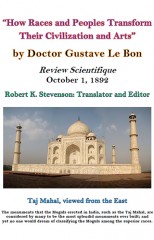
Author : Le Bon Gustave
Title : How Races and Peoples Transform Their Civilization and Arts
Year : 1892
Link download : Le_Bon_Gustave_-_How_Races_and_Peoples_Transform_Their_Civilization_and_Arts.zip
In a preceding work¹ I have attempted to show that it is completely impossible for superior races to impose their civilization on inferior races and make the latter accept it. Taking up and analyzing one by one the most powerful means of action which the Europeans have had at their command and have employed— education, institutions and beliefs—I have demonstrated the absolute insufficiency of these means of action for changing the social state of inferior peoples. In addition, I have tried to establish that all the elements of a civilization correspond to certain modes of feeling and thinking, that is to say, a mental constitution represents the past of all a race, the result of the experiences and actions of a long series of ancestors, the hereditary movers of behavior. In order to change the civilization of a people, it will be necessary to change its soul. Only centuries, and not conquerors, can accomplish such a task. We have also come to see that it is only by means of a series of successive stages, analogous to the ones that the Barbarians— destroyers of the Greco-Roman civilization—cleared, that a people may elevate themselves on the ladder of civilization. If, by means of education, one tries to make a people evade and by-pass these stages, one will only disorganize and throw into confusion these people’s morale and intelligence, and end up leading them back to a level lower than the one where they had arrived by themselves. Lastly, I have shown that today there is only one people—the Arabs—capable of civilizing inferior peoples, because it is the only one which still possesses very simple institutions and beliefs. It is thus that after having transformed an enormous swath of the Orient, Moslems are the only possible civilizers of Africa, whereas Europeans, its conquerors today, are only able to ravage it. Now, my argumentation, and the documents which will support it, relates above all to those inferior peoples who by reason of colonization are in contact with extremely civilized peoples. My intention here today is to generalize the question, and to show convincingly that superior races have never been influenced by a foreign civilization more rapidly than inferior races and that, if the former have sometimes adopted beliefs, institutions, languages and arts different from those of their ancestors, it is only after their having been transformed slowly and profoundly in a way that brings them into rapport with their mental constitution. History seems to contradict itself on each following page. One quite frequently sees, for example, peoples changing the elements of their civilization, adopting new religions, new languages, and new institutions. Some abandon centuries-old beliefs repeatedly in order to convert to Christianity, Buddhism or Islam; others change their language while, lastly, others radically modify their institutions and arts. It even seems that the appearance of a conqueror or an apostle is sufficient in order to produce very easily similar transformations. However, in our presenting the account of these abrupt revolutions, History only succeeds in accomplishing one of its habitual tasks: creating and propagating many mistakes. When one studies nearly all these supposed changes, one will soon notice that the names only of the things change readily, whereas the realities which hide themselves behind the words continue to live and only transform themselves with extreme slowness. Now, in order to substantiate and demonstrate how, behind the variable designations, the very slow evolution of things is accomplished, it will be necessary to study each element of each civilization among diverse peoples. This heavy task I have already attempted in many volumes²; I do not propose to recommence it here. Setting aside the numerous elements of civilizations, I shall only examine today one of them: the arts. Before entering upon the study of the evolution that the arts effect in passing from one people to another, I shall in the meantime make some remarks about the changes that the other elements of the civilization undergo, in order to show that the laws applicable to a single one of these elements are indeed applicable to all, and that, if the arts of a people are in rapport with a certain mental constitution, so also are the languages, institutions, beliefs, etc., and consequently, these elements cannot abruptly change, but instead are received indifferently by one people from another. It is mainly with regard to religious beliefs that this theory may seem paradoxical, but it is nevertheless in the history of these same beliefs that one can find the best examples to invoke in order to prove that it is just as impossible for a people to suddenly change the elements of its civilization as it is for an individual to change his height or the color of his eyes. Everybody is undoubtedly aware that all the great religions— Brahmanism, Buddhism, Christianity, Islam—have instigated mass conversions in entire races who have seemed to adopt the new religion all at once; however, when one engages in a deeper study of these conversions, one soon ascertains that what the peoples have primarily changed is the name of their religion, and not the religion itself; that in reality the adopted beliefs have undergone the necessary transformations in order to put themselves in rapport with the old beliefs that they have come to replace and of which they are therefore only the simple continuation. These transformations, supported by the beliefs passing from one people to another, are themselves so considerable that the newly-adopted religion does not have any visible relationship with the one from which it takes its name. The best example of this is the one provided by Buddhism which, after having been transported to China, has become at this point unrecognizable, so much so that scholars had at first taken it to be an independent religion, and had for a long time missed recognizing that this religion was merely Buddhism transformed by the race who had adopted it. Chinese Buddhism is not at all the Buddhism of India, which itself is very different from the Buddhism of Nepal and likewise differs from the Buddhism of Ceylon. In India Buddhism was but a schism of Brahmanism, which had preceded it, and from which it fundamentally differed quite little; in China it was also a schism of the earlier beliefs to which it had tightly attached itself. What is rigorously demonstrated for Buddhism is not any less so for Brahmanism. The races of India being extremely diverse, it is easy to suppose that, under identical names, they will come to possess extremely different religious beliefs. Certainly, all the Brahmanic peoples consider Vishnu and Siva as their fundamental divinities, and the Vedas as their sacred books; however, these fundamental gods only leave behind in the religion their names, and the sacred books but their text. One sees this in the innumerable cults that have been formed throughout India— cults where one comes across, depending on the races, the most varied beliefs: monotheism, polytheism, fetishism, pantheism, cults worshipping ancestors, demons, animals, etc. To not judge the cults of India other than from what the Vedas say, one will not obtain the slightest idea of the gods and beliefs which reign in this immense peninsula. The title of the sacred books is venerated among all the Brahmans, but of the religion that these books teach, nothing fully remains. ...

Palmer Michael - Hiroshima revidiert
Author : Palmer Michael Title : Hiroshima revidiert Die beweise für napalm und senfgas anstatt...














